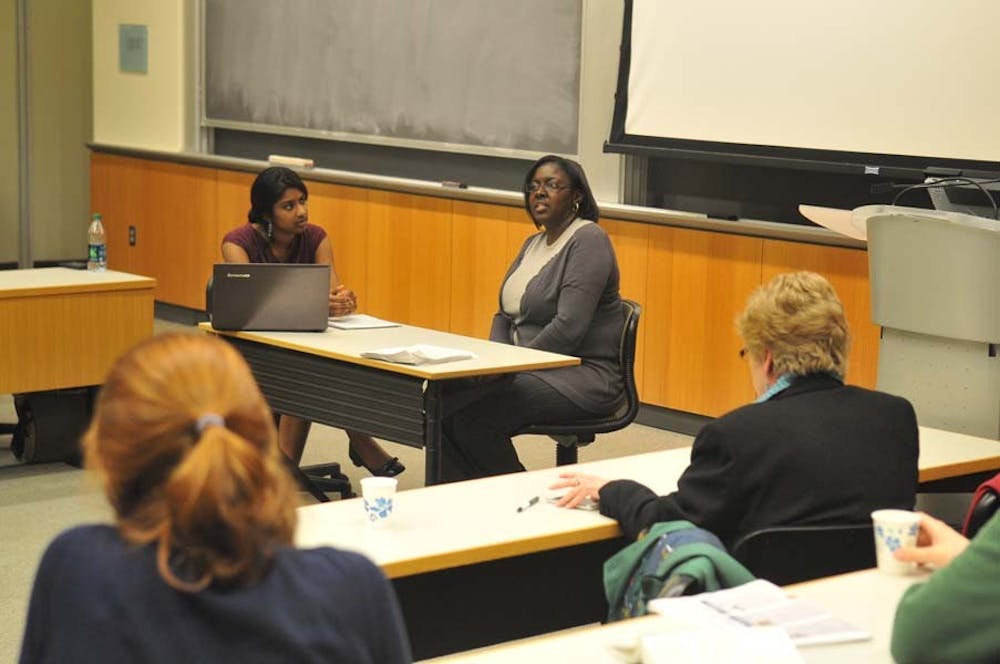As the defense prepares to present its case in the trial of Kermit Gosnell, several students and experts gathered Tuesday night to discuss the implications of the allegations against him.
At the “Awareness Campaign for Gosnell Murder Trial,” three speakers discussed some of the main issues surrounding Gosnell’s trial: women’s rights, health care and abortion.
The event began with a documentary that was part of the 3801 Lancaster Film Project — which depicted the conditions of Gosnell’s late-term abortion clinic, the Women’s Medical Society, through the eyes of some of Gosnell’s former patients.
One said that after she was raped, she went to his clinic for an abortion. She can no longer give birth due to procedures performed on her at the clinic.
Another woman in the documentary talked about how she was convinced by one of Gosnell’s employees to have an abortion at his clinic. After having eight abortions at the clinic, she said that she looked back at her past and asked, “What was I thinking?”
According to the film, it is estimated that Gosnell made between $10,000 and $15,000 a day for performing abortions.
After the documentary, Nursing freshman and event organizer Hannah Victor introduced the first speaker — Carol Tracy, executive director of the Women’s Law Project and lecturer for the Gender, Sexuality and Women’s Studies Program — to discuss Gosnell’s case.
In response to a question Victor posed about Gosnell’s attorney saying that he was simply “giving back to the community,” Tracy responded that this was completely false.
Related:
4/24/13: Three murder charges dropped in Gosnell trial
4/23/13: In case you missed it: Kermit Gosnell Case Highlights
3/18/13: Gosnell may face death penalty for late term abortion clinic
2/27/13: Local doctor to face murder trial
2/12/12: Gosnell case spurs legislators to introduce new abortion clinic regulations
11/27/11: Nearby abortion clinic physician charged with murder
“There is nothing that man did that has been a benefit to the community,” she said. “If all of these allegations prove to be true, he was a monster.”
Tracy noted that Gosnell even created medical procedures, including the process of “snipping,” whereby the spinal cords of infants are slit after they have exited the womb.
“The procedures that he used were not only below standards, but they weren’t standard,” Tracy added. “They didn’t exist anywhere else besides his clinic.”
School of Nursing lecturer Monica Harmon spoke next, discussing the health care issues brought up by Gosnell’s trial.
“[There were] problems with sanitation,” she said, “[and] a lot of his workers were unlicensed.”
The third speaker was College junior and Penn for Life co-president Catherine Imms, who spoke about abortion.
“One misunderstanding that pervades this entire debate is that the pro-life side … wants to restrict access to abortions,” Imms said.
Although she does not support abortion, she thinks “a large contingent of the pro-life movement is concerned with maintaining the safety of women.” She added that both sides must get past their differences “to talk about it.”
After Imms finished speaking, Victor opened the floor to comments from the audience on ways that Penn students can get involved in bettering the situation.
College sophomore Jack Washington suggested that increasing involvement in programs like Big Brothers, Big Sisters would decrease the frequency of abortions by “[helping] kids before they … get to the stage where they need abortions.”
College senior Austin Malach said that what the country might need, and what Penn students should do, is unite pro-life and pro-choice groups under the goal of improving women’s health care in the United States.
Related:
4/24/13: Three murder charges dropped in Gosnell trial
4/23/13: In case you missed it: Kermit Gosnell Case Highlights
3/18/13: Gosnell may face death penalty for late term abortion clinic
2/27/13: Local doctor to face murder trial
2/12/12: Gosnell case spurs legislators to introduce new abortion clinic regulations
11/27/11: Nearby abortion clinic physician charged with murder



